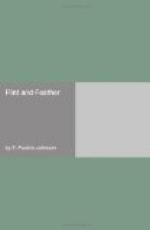The first periodicals to accept her poems and place them before the public were “Gems of Poetry,” a small magazine published in New York, and “The Week,” established by the late Professor Goldwin Smith, of Toronto, the “New York Independent,” and “Toronto Saturday Night.” Since then she has contributed to “The Athenaeum,” “The Academy,” “Black and White,” “The Pall Mall Gazette,” “The Daily Express,” and “Canada,” all of London, England; “The Review of Reviews,” Paris, France; “Harper’s Weekly,” “New York Independent,” “Outing,” “The Smart Set,” “Boston Transcript,” “The Buffalo Express,” “Detroit Free Press,” “The Boys’ World” (David C. Cook Publishing Co., Elgin, Illinois), “The Mothers’ Magazine” (David C. Cook Publishing Co.), “The Canadian Magazine,” “Toronto Saturday Night,” and “The Province,” Vancouver, B.C.
In 1892 the opportunity of a lifetime came to this young versifier, when Frank Yeigh, the president of the Young Liberals’ Club, of Toronto, conceived the idea of having an evening of Canadian literature, at which all available Canadian authors should be guests and read from their own works.
Among the authors present on this occasion was Pauline Johnson, who contributed to the programme one of her compositions, entitled “A Cry from an Indian Wife”; and when she recited without text this much-discussed poem, which shows the Indian’s side of the North-West Rebellion, she was greeted with tremendous applause from an audience which represented the best of Toronto’s art, literature and culture. She was the only one on the programme who received an encore, and to this she replied with one of her favourite canoeing poems.
The following morning the entire press of Toronto asked why this young writer was not on the platform as a professional reader; while two of the dailies even contained editorials on the subject, inquiring why she had never published a volume of her poems, and insisted so strongly that the public should hear more of her, that Mr. Frank Yeigh arranged for her to give an entire evening in Association Hall within two weeks from the date of her first appearance. It was for this first recital that she wrote the poem by which she is best known, “The Song my Paddle Sings.”
On this eventful occasion, owing to the natural nervousness which besets a beginner, and to the fact that she had scarcely had time to memorize her new poem, she became confused in this particular member, and forgot her lines. With true Indian impassiveness, however, she never lost her self-control, but smilingly passed over the difficulty by substituting something else; and completely won the hearts of her audience by her coolness and self-possession. The one thought uppermost in her mind, she afterwards said, was that she should not leave the platform and thereby acknowledge her defeat; and it is undoubtedly this same determination to succeed which has carried her successfully through the many years she has been before the public.




